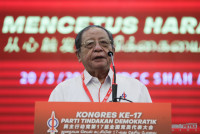THE concept of “supremacy” in countries of the Commonwealth of Nations is used to identify the rule of law which is empowered to enact and administer the country as per the oath of office of the constitutional functionaries.
The supremacy concept per se is not used by jurists and authors to discuss the status of common law or personal laws of citizens and its hierarchy among other laws of the state.
Unlike other Commonwealth countries, our federal constitution is drafted in such a manner as to provide for a dual system of law (federal and shariah) to operate without conflict or overlap. It has a very unique oath of office for constitutional functionaries in contrast to other Commonwealth countries to make sure the federal and state legislatures do not conflict in enacting laws in breach of the constitutional framework.
This oath of office is superior in nature and is similar to that of the oath taken by the US president. The proper understanding of the oath and its jurisprudence is essential to protect the fundamental rights as well as the constitutional guarantees set out in the constitution, and it is also the tool to guarantee social justice to the public.
The oath of office of the US president reads as follows:
“I do solemnly swear (or affirm) that I will faithfully execute the Office of President of the United States, and will to the best of my ability, preserve, protect and defend the Constitution of the United States.”
The oath of office of the Malaysian legislature per se and as a condition precedent requires them while legislating not to breach the constitutional and social justice guarantees as well as ensure the proportionality principle developed by the common law courts as adopted in Malaysia. This is not the position in England or India as per their legislatures’ oath of office.
Power endowed by oath to court
In my view, the difference in the oath of office in England and India is akin to the distinction between marble and pumpkin, but our legal pundits have not picked it up or advocated in full force to sustain rule of law and social justice at the apex-court level for the court to take judicial notice of the distinctions.
The oath gives the court absolute power to ensure the laws comply with the constitutional framework, and the legislatures do not breach the oath in enacting laws in breach of the constitution as well as proportionality and social justice principles. That absolute power to the court is not the position in England or India. That absolute power under our constitution originates from the oath of office.
The rulers (fourth.pillar) are empowered to ensure the rule of law is not compromised by any other pillars of the constitution namely the executive, legislature and judiciary (the three pillars of the constitution). The king of England or the president of India has no such obligations.
It is my considered view that the Malaysian jurists and legal industry have no sufficient knowledge in oath of office jurisprudence to seek declaration or judicial review of any legislation or constitutional amendment on the grounds of illegality for breach of oath of office, and in appropriate circumstance lodge a petition to the fourth.pillar to sustain the rule of law.
The reason for this shortcoming is the result of book writers, jurists and the legal industry copy pasting English or Indian jurisprudence without giving critical thought to the oath of office, which had been admirably planted by our founding fathers of the constitution to preserve, protect and defend the rights of Malaysians under the constitution.
The Malaysian chapter of Social Justice, Constitutional Oath Jurisprudence has been captured in my booklet (available for free) for the benefit of the Malaysian public, which also sets out the test to check arbitrariness of legislature and other decision makers by incorporating the test set out by HRH Raja Azlan Shah in the case of Pengarah Tanah dan Galian, Wilayah Persekutuan v Sri Lempah Enterprise Sdn. Bhd.
Common law of England
England is a country which had practised the concept of parliamentary supremacy (sovereignty) for nearly one thousand years. This concept dictates absolute power to Parliament to dictate the law of the land.
Even though the king of England and large members of the public inclusive of parliamentarians were and are of the Christian faith, and public function ceremonies in the presence of the king may have the touch of their faith, but the law of England was not declared as one related to the Christian faith. It is my observation that common law is harmonious or not objectionable to the major religions and practices of the world in most aspects.
The law of England was always the common law as found in the judicial decisions, and any law dictated by Parliament was not based on giving primary or secondary importance to the Christian faith.
England had also colonised many countries with people of different faiths, but it had never obstructed the religion of other faiths or laws or customary practice to continue, except it has kept exclusive control of criminal law within its dominance and religious criminal law or penal practices of others were disregarded.
The law was only meant to administrate the country as per rule of law and was not to thrust the dominance of religious supremacy of the religion on to the general public.
Their concept in crude terms can be summarised as to say “allegiance to the king and obey the laws of the land as per judicial decisions, customary practices and fiat of Parliament.”
The source of common law and practice has its roots from the law of the Roman Empire and also may encompass many other laws of other religions as well as practices. For example, offer and acceptance in contract has similarities to Islamic law on contract including law of marriage.
How the Malaysian position differs
The learning of law from the Inns of Courts where barristers qualify to practise law has similarities to the madrasah concept of Muslims or the gurukulam concept of ancient India, for example on the point of commonality. In relation to Islam it can easily be identified by reading Medjelle (Civil Code of Ottoman Empire) and comparing it with common law. In essence common law harmonises many other laws in practice and that may include laws derived from other religions or practices.
India is a country which has accepted its constitution as supreme with no allegiance of supremacy of any faith or religion even though its substantial population practise the Hindu faith, but has recognised that all religions as well as religious personal laws, (not criminal laws) can be practised in a peaceful manner.
The position in Malaysia is quite different. The Malay rulers had been magnanimous in formulating the constitution to ensure the personal family laws of the Muslims is absolutely protected, but the Muslim penal laws are restricted to harmonise with the federal laws and the constitution. The strictures if any had been carefully thought and deliberated to stop any form of overlap in criminal jurisdiction.
Within this framework Muslim laws attains its supremacy status in Malaysia and shariah Courts are the supreme arbiters for Muslim family law with some minimum jurisdiction in relation to criminal law which is applicable for all born Muslims. However, when it relates to converts and the disputes therein, the civil court or shariah court’s jurisdiction may in some instances become a moot point for debate and judicial decisions. These disputes can be easily harmonised with the creation of special courts to deal with conflict of law cases. – The Vibes, August 24, 2023
Datuk Hamid Sultan Abu Backer is a retired judge of the Court of Appeal, and professor of arbitration and dispute resolution at Mahsa University

















.jpg)

